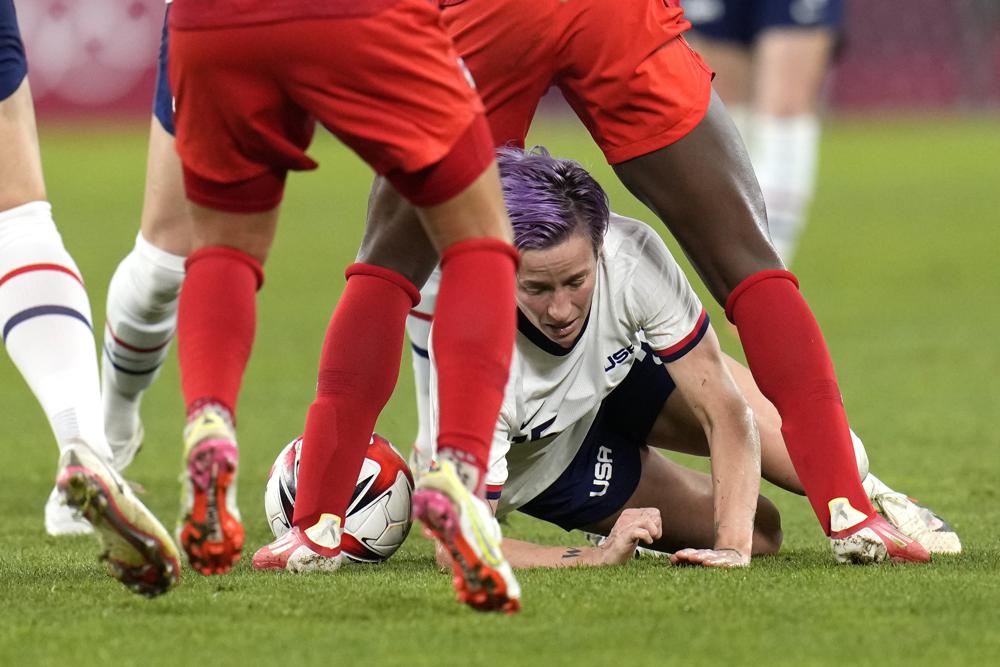|
Getting your Trinity Audio player ready...
|
Edited by: TJVNews.com
The world of sports has always been a realm where emotions run high, victories and defeats carve the path of careers, and athletes become symbols of various ideals. In a recent turn of events, the intersection of athletic performance and activism has ignited controversy, with former news anchor Megyn Kelly taking a critical stance on soccer star Megan Rapinoe’s response to a missed penalty kick during a crucial World Cup match, as was reported by the New York Post.
Megan Rapinoe, known both for her athletic prowess and her vocal advocacy on contentious social issues, found herself under scrutiny when her missed penalty kick contributed to the US women’s team’s shocking exit from the World Cup quarterfinals, with Sweden prevailing in a sudden-death shootout.
The Post reported that in her SiriusXM podcast, “The Megyn Kelly Show,” Kelly expressed her outrage at Rapinoe’s seemingly lighthearted reaction to the missed kick. Kelly pointed out that Rapinoe’s apparent smile and laughter in the aftermath of the crucial moment clashed with the gravity of the situation. Kelly’s critique delved into the notion that Rapinoe’s “wokeness” had detracted from her focus on the game, leading to an eventual loss.
“She couldn’t execute,” Kelly remarked, implying that Rapinoe’s focus on her left wing activism had an impact on her performance and the team’s mindset. The Post report also said that Kelly referred to Rapinoe as “the Mark Milley of soccer,” alluding to the criticism faced by the top military officer for prioritizing “wokeness” in the armed forces.
Rapinoe’s outspoken stance on issues such as kneeling during the national anthem and advocating for transgender inclusion in sports has undoubtedly elevated her profile beyond the realm of athletics. However, Kelly’s criticism suggests that this dedication to spewing forth “wokeism” may have overshadowed her commitment to the sport of soccer.
Rapinoe herself addressed her reaction to the missed penalty kick, explaining that her smile was a reaction to the unexpectedness of the situation. She clarified that she had never before missed a penalty kick in such a manner, which is why her response appeared to be counterintuitive, as was reported by the Post.
Rapinoe explained her reaction, saying: “That’s like a sick, sick joke. I’ve never hit it over, when I miss they are saved. That’s why I had that smile on my face,” the Post reported.
Despite Rapinoe’s explanation, Kelly remained skeptical, suggesting that her priorities were more aligned with personal gains, specifically her endorsement deals with Nike, rather than the team’s success.
“It was a miss, it was a loss, and it was the end of her career. And good. Goodbye,” Kelly said, as was reported by the Post. “I won’t miss her or her leadership.”
The US team had faced backlash after several starting players apparently refused to sing the national anthem during the group stage, an unpatriotic move that Kelly laid at the feet of Rapinoe, as was reported by the Post.
Kelly’s critique extended beyond the incident itself. The Post reported that she noted that other athletes who have represented the United States on the global stage, such as basketball player LeBron James and the 1980 “Miracle on Ice” US men’s hockey team, displayed a deeper sense of national pride and seriousness when it came to their performance.
The debate surrounding Rapinoe’s reaction and activism underscores the fine balance that athletes must strike between personal beliefs and their roles as representatives of their country on the international stage. As sports continue to serve as a platform for advocacy, questions about the extent to which these pursuits influence athletic performance and team dynamics will likely persist.
At the heart of this controversy lies the question of whether the merging of sports and activism can coexist harmoniously or if they inherently lead to a clash of priorities. While Rapinoe’s actions have undoubtedly contributed to raising awareness about important social issues, Kelly’s criticism shines a spotlight on the potential implications of mixing such passions on the field of play. As the discourse continues, it remains to be seen how athletes will navigate this intricate balance in the years to come.





